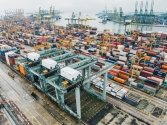
Philippines clinches Moody's investment grade with Baa3 rating
Tagged with positive outlook to the rating.
In a release, Moody's Investors Service has today upgraded the rating of the Government of the Philippines by one notch to Baa3 from Ba1.
At the same time, Moody's has assigned a positive outlook to the rating.
This year, major credit raters Fitch and Standard and Poor's have also upgraded the country's ratings.
The rating action concludes the review for upgrade announced on 25 July 2013.
The factors that prompted the review remain intact, namely the sustainability of the country's 1) robust economic performance; 2) ongoing fiscal and debt consolidation; and 3) political stability and improved governance.
In addition, the stability of the Philippines' funding conditions -- during the recent bout of market volatility in emerging markets -- points to the country's relative lack of vulnerability to external financial shocks, such as those arising from anticipated tapering by the US Federal Reserve of its quantitative easing policy.
In a related rating action, Moody's has upgraded the government's foreign currency shelf rating to (P)Baa3 and the ratings for the liabilities of the country's central bank, Bangko Sentral ng Pilipinas (BSP), to Baa3. These have also been assigned a positive outlook.
RATIONALE FOR THE UPGRADE
The Philippines' economic performance has entered a structural shift to higher growth, accompanied by low inflation. Real GDP expanded by 6.8% in 2012 and 7.6% year-on-year in the first half of 2013.
These levels are among the fastest rates of growth in Asia-Pacific and across emerging markets globally. At the same time, CPI inflation remains well anchored and is currently below the central bank's target range.
The new growth path is being reinforced in part by improved fiscal management. Revenue growth has accommodated sizeable increases in infrastructure and social spending, although revenue generation remains weak when compared with investment-grade countries overall.
Nevertheless, since 2008, the Philippine government has regularly recorded fiscal deficits that are narrower than the Baa3-rated median.
Primary surpluses recorded in eight of the past 10 years will likely continue over the five-year medium-term horizon, allowing for further consolidation of the government's debt burden. Yet, government debt as
measured against GDP will remain higher than most similarly rated peers.







 Advertise
Advertise









